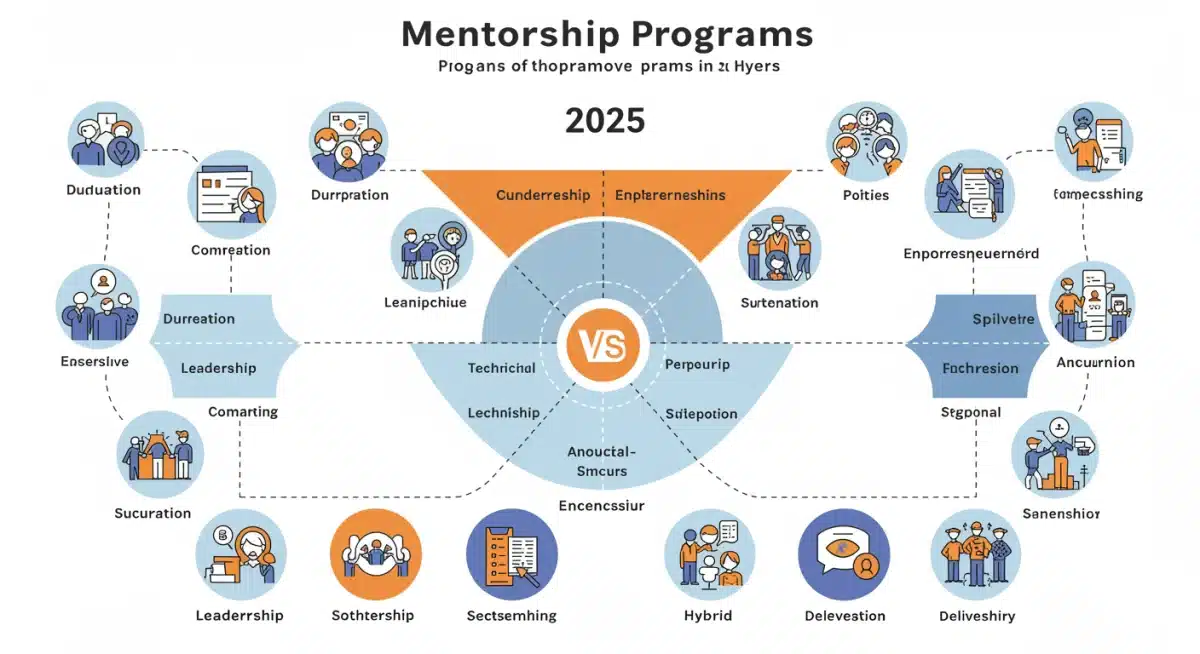Mentorship Programs 2025: Your Best Fit for Career Growth

Advertisements
For women aiming to accelerate their professional trajectories, a comprehensive comparison of mentorship programs: finding your best fit for career growth in 2025 is essential, highlighting structured, informal, and specialized options to match individual aspirations and industry demands.
As 2025 unfolds, the landscape of professional development continues to evolve, making a comprehensive comparison of mentorship programs: finding your best fit for career growth in 2025 more critical than ever for women aspiring to leadership and career advancement. This analysis delves into the nuances of available programs, offering insights into what truly drives professional success in today’s dynamic work environment.
Understanding the Evolving Mentorship Landscape in 2025
The role of mentorship has expanded beyond traditional one-on-one relationships, now encompassing a diverse array of structures and specializations designed to meet varied career needs. In 2025, women seeking to enhance their career growth must navigate a rich ecosystem of programs, each offering unique benefits and approaches.
This year, the emphasis is increasingly on tailored experiences that align with specific career stages and industry demands. From executive leadership programs to technical skill development and entrepreneurial guidance, the options are more sophisticated and accessible than ever before. Understanding these shifts is the first step toward making an informed decision about which program will yield the most impactful results for your professional journey.
Key Trends Shaping Mentorship
- Digital Transformation: The rise of AI-driven matching and virtual platforms has made mentorship more accessible globally.
- Specialized Niches: Programs are increasingly focused on specific industries, roles, or skill sets, such as STEM, finance, or product management.
- Diversity and Inclusion: A strong emphasis on connecting mentees with mentors from diverse backgrounds to foster inclusive leadership.
- Reverse Mentorship: Younger professionals mentoring senior leaders on emerging technologies and cultural shifts.
These trends highlight a move toward more flexible, outcome-oriented mentorship experiences. The goal remains consistent: to provide guidance, support, and opportunities that accelerate career progression, but the methods and structures are continuously adapting to the modern professional landscape. Choosing the right program requires a clear understanding of your own goals and how different models can help achieve them.
Traditional vs. Modern Mentorship Models: A Deep Dive
When considering a comparison of mentorship programs: finding your best fit for career growth in 2025, it is crucial to differentiate between traditional and modern models. While traditional mentorship often involves a long-term, hierarchical relationship, modern approaches are more agile, diverse, and often technology-driven, offering varied levels of engagement and structure.
Traditional models, typically found within established corporate structures, emphasize a senior employee guiding a junior one over an extended period, focusing on career pathing, organizational culture, and skill development. These relationships are often built on organic connections or formal internal programs, providing deep, sustained guidance.
Modern models, however, embrace flexibility. They include peer mentorship, group mentorship, flash mentorship, and platform-based programs that connect mentees with multiple mentors for specific goals or short-term advice. This shift reflects the fast-paced nature of today’s careers and the need for diverse perspectives and rapid skill acquisition.
Advantages and Disadvantages
- Traditional: Offers deep relationships, comprehensive guidance, and a strong understanding of organizational politics. Can be time-consuming and limited by availability of senior mentors.
- Modern: Provides flexibility, diverse perspectives, and access to specialized expertise. May lack the depth of long-term relationships and require more self-direction from the mentee.
For women aiming for career growth in 2025, the choice between these models depends on personal learning style, career stage, and specific objectives. Some may thrive in the structured environment of a traditional program, while others might benefit from the varied insights offered by modern, multi-mentorship approaches. The key is to assess which model best aligns with your current needs and future aspirations.
Industry-Specific Programs: Tailoring Your Mentorship Experience
A significant aspect of the comparison of mentorship programs: finding your best fit for career growth in 2025 involves examining industry-specific offerings. These programs are meticulously designed to address the unique challenges, opportunities, and skill requirements within particular sectors, providing highly relevant guidance that general programs might miss.
For women in fields such as technology, finance, healthcare, or creative arts, an industry-specific mentorship program can provide invaluable insights into sector-specific trends, regulatory landscapes, and unwritten rules for advancement. Mentors in these programs typically possess deep, firsthand experience within the industry, offering practical advice and strategic networking opportunities.
For instance, a woman in tech might benefit from a program that connects her with a female CTO, who can guide her through navigating male-dominated environments and excelling in highly technical roles. Similarly, an aspiring leader in healthcare could gain from a mentor who understands the complexities of patient care, policy, and innovation in the medical field.
Sectoral Focus and Benefits
- Tech & STEM: Focus on coding skills, product development, leadership in innovation, and navigating gender disparities.
- Finance & Banking: Guidance on market trends, investment strategies, regulatory compliance, and breaking glass ceilings in executive roles.
- Healthcare: Insights into clinical leadership, healthcare policy, patient advocacy, and managing complex organizational structures.
- Creative & Media: Mentorship on portfolio development, industry networking, intellectual property, and adapting to evolving digital platforms.
These specialized programs often offer a more direct path to career acceleration by providing targeted knowledge and connections. The specificity of the advice received can be a game-changer, enabling mentees to bypass common pitfalls and capitalize on niche opportunities. When evaluating programs, consider whether an industry-specific approach offers the precise expertise you need for your chosen field.
Evaluating Program Structure and Support Systems
The effectiveness of any mentorship program largely hinges on its structure and the support systems it provides. A thorough comparison of mentorship programs: finding your best fit for career growth in 2025 must critically assess how programs are organized, how mentors and mentees are matched, and what resources are available to facilitate a successful relationship.
Structured programs often include defined goals, regular check-ins, and curated content or workshops to support the mentorship journey. They may also offer dedicated program managers who oversee matches, provide training, and intervene if challenges arise. This level of organization can be particularly beneficial for mentees who prefer clear guidelines and accountability.
On the other hand, less structured or informal programs rely more on the initiative of the mentor and mentee. While this can foster more organic and flexible relationships, it may also lead to less consistent engagement. Many modern programs strike a balance, offering a framework while allowing for personalized interactions.
Essential Structural Components
- Matching Process: How are mentors and mentees paired? Is it algorithm-driven, manual, or based on mentee preference?
- Communication Guidelines: Are there recommended frequencies for meetings, preferred communication channels, and clear expectations for engagement?
- Resource Provision: Does the program offer workshops, learning materials, networking events, or access to exclusive communities?
- Feedback Mechanisms: How does the program ensure quality and address issues? Are there regular evaluations or mediation services?
A robust support system ensures that both mentors and mentees feel valued and equipped for success. Look for programs that invest in training for mentors, provide clear objectives for mentees, and offer avenues for feedback and continuous improvement. The presence of these elements can significantly enhance the likelihood of a productive and fulfilling mentorship experience.

Leveraging Technology for Enhanced Mentorship
In 2025, technology plays an increasingly pivotal role in shaping and delivering mentorship experiences, drastically impacting the comparison of mentorship programs: finding your best fit for career growth in 2025. Digital platforms, AI-driven matching tools, and virtual communication channels have broadened access and diversified the modalities of mentorship, especially for women with demanding schedules or geographical constraints.
Virtual mentorship platforms allow mentees to connect with mentors across the globe, breaking down geographical barriers and expanding the pool of potential guides. This means a woman in a niche industry in a less populated area can still find a highly specialized mentor in a major metropolitan hub. These platforms often come equipped with scheduling tools, communication features, and resource libraries, streamlining the mentorship process.
AI algorithms are now being used to create more precise mentor-mentee matches based on skills, career goals, personalities, and even learning styles. This moves beyond superficial pairings, aiming to foster more compatible and effective relationships from the outset. Furthermore, data analytics can provide insights into program effectiveness, helping organizations refine their offerings.
Technological Innovations in Mentorship
- AI Matching: Algorithms analyze profiles to suggest highly compatible mentor-mentee pairs, increasing the likelihood of successful outcomes.
- Virtual Platforms: Dedicated online portals for scheduling, video calls, instant messaging, and resource sharing, making remote mentorship seamless.
- Progress Tracking Tools: Digital dashboards for mentees to set goals, track progress, and receive feedback, enhancing accountability.
- Gamification: Incorporating elements like badges, leaderboards, and challenges to boost engagement and motivation within mentorship programs.
The integration of technology makes mentorship more dynamic, measurable, and accessible. For women considering mentorship programs in 2025, evaluating the technological infrastructure and tools offered by a program is crucial. A program that effectively leverages technology can provide a more efficient, engaging, and ultimately more impactful mentorship journey, aligning with the demands of modern professional life.
Measuring Success and Long-Term Impact
A critical, yet often overlooked, aspect in the comparison of mentorship programs: finding your best fit for career growth in 2025 is how success is measured and what long-term impact programs deliver. For women investing their time and energy, understanding the potential returns on this investment is paramount. Effective programs don’t just facilitate connections; they drive measurable career advancement and personal development.
Success can be quantified through various metrics, including promotions, salary increases, skill acquisition, expanded professional networks, and increased job satisfaction. Programs that track these outcomes provide valuable data points for prospective mentees. Beyond quantitative measures, qualitative feedback, such as improved confidence, enhanced leadership skills, and a clearer career vision, also signifies a program’s effectiveness.
The long-term impact extends beyond immediate career milestones. A strong mentorship can instill resilience, foster a growth mindset, and cultivate a sense of belonging within one’s industry. For women, who often face unique challenges in the workplace, these intangible benefits can be as crucial as tangible career advancements, shaping their trajectory for years to come.
Indicators of Program Effectiveness
- Career Advancement Rates: Tracking how many mentees achieve promotions or transition into higher-level roles post-program.
- Skill Development: Assessing improvements in specific competencies through pre and post-program evaluations.
- Network Expansion: Quantifying the growth in professional connections and opportunities.
- Mentee Satisfaction: Surveys and testimonials reflecting the quality of the mentorship relationship and overall program experience.
- Retention Rates: For internal corporate programs, measuring the retention of mentees within the organization.
When selecting a program, inquire about its success metrics and how it supports long-term growth. Programs that are transparent about their outcomes and actively seek to measure their impact demonstrate a commitment to their mentees’ success. This focus on demonstrable results ensures that the mentorship experience is not just enriching but also strategically beneficial for your career trajectory in 2025 and beyond.

Making Your Choice: A Strategic Approach
The ultimate goal of any comparison of mentorship programs: finding your best fit for career growth in 2025 is to empower women to make an informed and strategic choice. This decision should not be taken lightly, as the right mentorship can be a catalyst for significant career acceleration, while a misalignment can lead to wasted time and resources.
Begin by clearly defining your career objectives for the next 1-3 years. Are you aiming for a promotion, a career transition, skill mastery, or entrepreneurial guidance? Your goals will dictate the type of program and mentor you need. Next, assess your preferred learning style. Do you thrive in structured environments, or do you prefer more organic, flexible interactions?
Research programs thoroughly, looking beyond superficial descriptions. Engage with current or past mentees to gather firsthand accounts of their experiences. Consider the program’s reputation, success stories, and the caliber of its mentors. Also, evaluate the time commitment required and ensure it aligns with your current professional and personal obligations.
Key Considerations for Selection
- Define Your Goals: Clearly articulate what you hope to achieve through mentorship.
- Assess Your Learning Style: Determine if you prefer structured, informal, or hybrid approaches.
- Research Mentor Profiles: Look for mentors with relevant experience, industry knowledge, and a track record of successful guidance.
- Program Cost and ROI: Evaluate the financial investment against the potential career benefits.
- Networking Opportunities: Consider if the program offers avenues to expand your professional network beyond the mentor-mentee relationship.
By adopting a strategic approach to program selection, women can significantly increase their chances of finding a mentorship experience that not only meets their immediate needs but also provides lasting benefits for their career growth. The right fit in 2025 is about alignment—between your aspirations, the program’s offerings, and the mentor’s expertise.
Key Aspect |
Description in 2025 > |
|---|---|
Program Structure |
Ranges from highly formal corporate programs to flexible, platform-based engagements. |
Industry Focus |
Specialized programs offer targeted guidance for specific sectors like Tech, Finance, Healthcare. |
Technological Integration |
AI matching, virtual platforms, and progress tracking tools enhance accessibility and effectiveness. |
Success Measurement |
Evaluated by career advancement, skill development, network growth, and mentee satisfaction. |
Frequently Asked Questions About Mentorship Programs in 2025
Joining a mentorship program in 2025 offers accelerated career growth, enhanced skill development, expanded professional networks, and personalized guidance from experienced professionals. It helps navigate career challenges, gain industry insights, and build confidence, ultimately fostering a clearer path to leadership and success.
To choose the right program, first define your specific career goals and preferred learning style. Then, compare programs based on their structure, industry focus, mentor profiles, and technological support. Seek testimonials and consider how well the program aligns with your long-term aspirations and available time commitment.
Yes, virtual mentorship programs can be highly effective, especially with advancements in digital platforms and AI matching. They offer greater flexibility, access to a wider pool of global mentors, and often integrate tools for progress tracking. The key is consistent engagement and clear communication, regardless of the format.
In 2025, AI is increasingly used for precise mentor-mentee matching, analyzing compatibility based on skills, goals, and personalities. AI also powers virtual platforms with features like smart scheduling, resource recommendations, and performance analytics, making mentorship more efficient and tailored to individual needs.
To ensure long-term success, women should set clear expectations, actively engage, and maintain open communication with their mentors. Proactively seek feedback, implement advice, and regularly assess progress against defined goals. Cultivating the relationship beyond formal meetings can also lead to lasting professional support and friendship.
What This Means for Women of the Future
The continuing evolution of mentorship programs in 2025 presents unparalleled opportunities for women to strategically advance their careers. By understanding the diverse options and making informed choices, women can leverage these programs not just for immediate gains but for sustained growth, leadership development, and building robust professional networks that will serve them throughout their careers. The emphasis is now on personalized, impactful connections that truly empower the next generation of female leaders.





